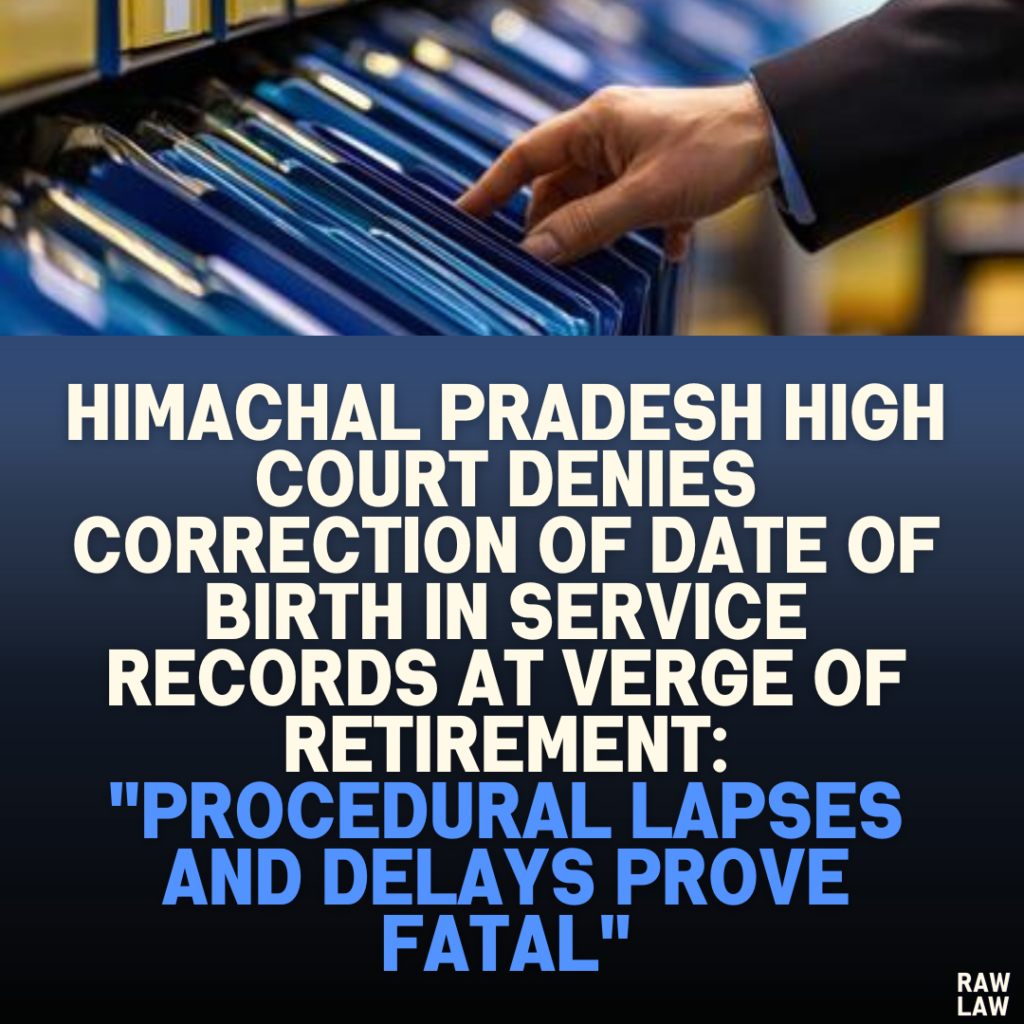Court’s Decision
The Himachal Pradesh High Court dismissed the petitioner’s writ petition seeking the correction of his date of birth in his service records. The court emphasized that:
- The petitioner made the request too late, only three months before his retirement.
- Procedural rules mandate timely applications for such corrections, and failure to adhere to these rules invalidates claims, even when the evidence suggests an error.
- The petitioner’s employer could not be bound by a civil court decree when it was not a party to the proceedings.
Facts
- Employment and Service History:
- The petitioner began his career as a daily-waged fieldman in 1987.
- His services were regularized in 1998, and his date of birth was recorded as April 15, 1966, based on his matriculation certificate.
- Civil Suit for Correction:
- In 2022, the petitioner filed a civil suit against the Himachal Pradesh Board of School Education, claiming his correct date of birth was January 16, 1969.
- The civil court decreed in his favor in January 2024, ordering the correction of his matriculation records.
- Representation to Employer:
- On February 7, 2024, the petitioner requested his employer to update his date of birth in the service records. This was rejected on February 23, 2024.
- The petitioner retired on April 30, 2024, while his recorded date of birth in the service record remained unchanged.
- Employer’s Rejection:
- The employer denied the request, citing significant delay and procedural non-compliance with applicable rules.
Issues
- Whether the petitioner’s request for correction of his date of birth in service records was timely and procedurally valid.
- Whether the civil court decree, binding the education board, could compel the employer to amend its service records.
Petitioner’s Arguments
- The petitioner contended that the civil court decree established his correct date of birth as January 16, 1969.
- He argued that the decree bound his employer to update his service records accordingly.
Respondent’s Arguments
- The respondents opposed the petition on the grounds that:
- The petitioner’s request was delayed by over two decades since his date of birth was recorded in 1998.
- He had not followed procedural requirements under Fundamental Rules and Himachal Pradesh Financial Rules.
- The employer was not a party to the civil suit and, therefore, not bound by its decree.
Analysis of the Law
- Rules on Date of Birth Corrections:
- Fundamental Rule 56 and Himachal Pradesh Financial Rules prescribe specific conditions for correcting the date of birth:
- Requests must be made within five years of joining service (or two years as per certain financial rules).
- Corrections are allowed only if there is a genuine bona fide mistake, and no unfair advantage is derived.
- Fundamental Rule 56 and Himachal Pradesh Financial Rules prescribe specific conditions for correcting the date of birth:
- Judicial Precedents:
- Bharat Coking Coal Ltd. v. Shyam Kishore Singh (2020):
- Corrections requested at the “fag end” of service disrupt administrative processes and harm other employees awaiting promotions.
- State of M.P. v. Premlal Shrivas (2011):
- Even if there is strong evidence of an error, corrections cannot be claimed as a matter of right if not sought within a reasonable timeframe.
- Laxmi Singh Verma v. H.P. Board of School Education (2021):
- Civil decrees binding educational boards cannot compel employers unless they are parties to the proceedings.
- Bharat Coking Coal Ltd. v. Shyam Kishore Singh (2020):
Precedent Analysis
The court referred to several judgments to highlight that:
- Delay and Laches: Requests for corrections made near retirement are unsustainable unless exceptional circumstances exist.
- Binding Nature of Decrees: A decree against an education board does not automatically bind the employer if it was not a party to the suit.
- Administrative Impact: Late corrections adversely affect the rights of other employees and administrative stability.
Court’s Reasoning
- Delay in Request:
- The petitioner first raised his grievance on February 7, 2024, nearly 26 years after the recording of his date of birth in 1998.
- The court noted that such delays negate the possibility of correction under Fundamental Rules and Financial Rules.
- Non-Impleadment of Employer:
- The petitioner’s employer was not a party to the civil suit; thus, the decree against the education board could not compel the employer to alter service records.
- Lack of Bona Fide Mistake:
- The petitioner failed to demonstrate any genuine mistake made during the recording of his date of birth.
- Precedent Compliance:
- Applying the principles laid down in Bharat Coking Coal Ltd. and Premlal Shrivas, the court concluded that the petitioner’s claims were unsustainable.
Conclusion
The court dismissed the petition, holding that:
- The petitioner’s request was procedurally non-compliant and significantly delayed.
- The civil court decree did not bind the employer, as it was not a party to the suit.
- The petitioner’s retirement further rendered the request moot.
Implications
- Emphasis on Procedural Compliance:
- Public servants must follow established rules and timelines for correction of service records.
- Protection of Administrative Integrity:
- The decision safeguards against disruptions caused by late corrections, ensuring fairness to other employees.
- Limited Scope of Civil Decrees:
- Employers are not bound by decrees unless impleaded, reinforcing the importance of including all relevant parties in litigation.




Pingback: Bombay High Court Allows Partial Relief in Property Dispute: "Consent Terms Upheld While Third-Party Purchaser Zenith Impleaded for Adjudication of Possession Claims Over Disputed Flats" - Raw Law